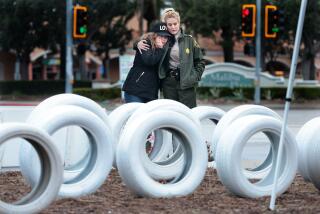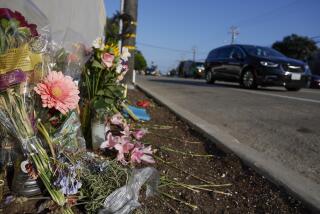Westminster Students Plan a Rendezvous With ‘Death’
- Share via
WESTMINSTER — The Grim Reaper is planning a trip to Westminster High School.
He’ll tap on the shoulders of 30 students, one every 15 minutes, and proclaim them victims of fatal drunk-driving accidents.
Police officers then will contact the parents and tell them their children are dead.
The action is meant to simulate what it would be like if students at that high school died in drunk-driving accidents. Students and parents have agreed ahead of time to participate in the program, but organizers hope their audience will walk away changed.
The three-day program, known as Every Fifteen Minutes (a national statistic referring to the frequency of drunk-driving deaths among teens), will be organized by the Westminster Police Department and the Orange County Fire Authority. The event is timed to take place just before the prom in late April.
A staged lunchtime car wreck is also a part of the program. Police cars, sirens blaring, will race to campus and an ambulance will carry the participating students away. One of them will pretend to die at the scene.
“I want to shock their senses, and make them realize, this could be you going to the morgue in a body bag,” said Al Brackett, a traffic investigator with the Westminster Police Department who introduced the program to his alma mater.
“When they are taken away from society, everyone hurts. Those of us in fire and medical, those of us who respond to those accidents, when we walk away, we are still left feeling the hurt in our hearts,” Brackett said.
To participate in the program, students and their parents must apply and a selection committee will choose 50 juniors and seniors, only 30 of whom will be listed as fatalities. The parents of all applicants will have to write their children’s obituary, which will be read to other students.
Anji Clemens, director of student activities at Westminster High, said convincing parents to write the obituaries is one of the toughest parts of the application process.
“You don’t want to talk about the living dying, especially if it’s the death of your own child,” said Clemens.
During the program, the students who participate will be taken to a hotel after they have been pronounced dead, but their whereabouts will be unknown. They will have to stay there overnight, which is intended to give the students a feeling of being alone, and parents will also feel what it’s like not to have their children around.
*
That night, the teens will write an essay about the day’s events. Three will be chosen and read the next day at a presentation for juniors and seniors at the school.
On the third day, the 50 students and their parents will gather for discussion groups with police and counselors.
While organizers acknowledge that high school students drink, they just want to stop them from getting in their cars.
“This is a big issue with kids,” said senior Monica Laird, who applied to participate this week. “Obviously, none of us wants to lose our classmates. All these big celebrations are coming up and the last thing I want to see is an empty seat at graduation.”
One of Laird’s classmates, Connie Attard, said it took some convincing before her parents agreed to write the obituary.
“At first, they were kind of not sure,” Attard said. “I didn’t know they could handle it.” But she said her parents were convinced of the educational value of the program.
The program was introduced to Brackett after he attended a conference last year where Chico police presented a video documentary.
Trish Beckman, community services officer with the Chico Police Department, said she and Officer Melody Davidson adapted the program from one that began in Spokane, Wash.
The event is a method to shock teenagers, Beckman said. Without the element of shock, many wouldn’t care enough to make a change in their lives.
“When you’re working with high school students, there has to be an element of realism. They were looking at their friend in their class at one moment and then that person is gone overnight,” Beckman said. “It stops and makes them think this can happen to me, as opposed to something they read or see on TV.”
More to Read
Sign up for Essential California
The most important California stories and recommendations in your inbox every morning.
You may occasionally receive promotional content from the Los Angeles Times.













